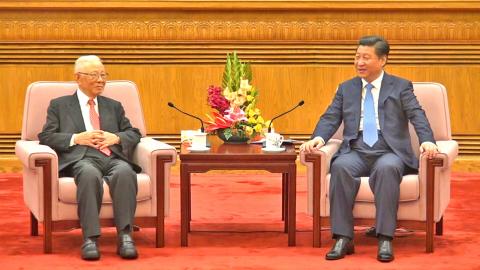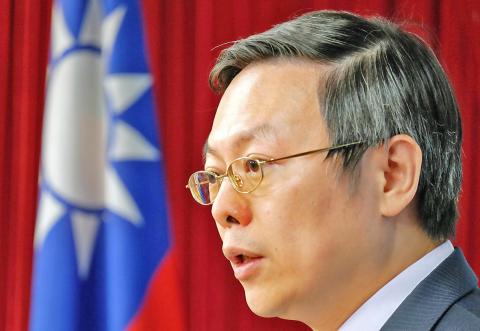The government cannot accept the so-called “one country, two systems” arrangement described by Chinese President Xi Jinping (習近平) as Beijing’s solution to solving the “Taiwan problem,” Premier Jiang Yi-huah (江宜樺) said yesterday.
During a meeting with pro-unification groups from Taiwan led by New Party Chairman Yok Mu-ming (郁慕明) in Beijing yesterday morning, Xi said that “peaceful unification and the ‘one country, two systems’ policy are [China’s] basic guidelines for solving the ‘Taiwan problem.’”
It was the first time Xi discussed China’s “one country, two systems” framework with visitors from Taiwan since he took office in November 2012.

Photo: CNA
Xi emphasized that “unification” would be “an end to the political standoff, rather than about rebuilding territory or sovereignty.”
He also slammed the movement for Taiwanese independence.
Democratic Progressive Party (DPP) legislators berated Xi’s remarks, saying that Hong Kong’s example shows that the proposed system is already a failure.

Photo: AFP
“What’s happening in Hong Kong now shows that ‘one country, two systems’ is a failure. Beijing should try to solve the problems in Hong Kong first, because its handling of the political situation in Hong Kong is a slap in its own face,” DPP caucus whip Tsai Chi-tsang (蔡其昌) said in the legislature.
“Before talking about ‘one country, two systems,’ Beijing had better ask how Hong Kongers feel about it first,” Tsai said.
DPP Legislator Chen Chi-mai (陳其邁) said that he suspected that Xi was responding to Ma’s erroneously reported call for eventual “unification” under the German model.
The Presidential Office said on Thursday that a Chinese-language report by Deutsche Welle was a misrepresentation of President Ma Ying-jeou’s (馬英九) interview with several European media outlets.
“The Chinese Communist Party [CCP] and the Chinese Nationalist Party [KMT] apparently give each other support to attract pro-
unification, pan-blue camp supporters,” Chen said. “But it is not going to succeed, as most Taiwanese would not buy it.”
Academia Sinica assistant research fellow Huang Kuo-chang (黃國昌), who is also one of the leaders of the Sunflower movement, called Xi’s remarks “ridiculous,” saying they are only suitable to “slaves wanting to gain favor with the CCP and should not be made public.”
“We understand that different people might have different interpretations of history, but China must not overlook the universal values of democracy and rule of law,” DPP spokesperson Huang Di-ying (黃帝穎) said. “Taiwanese insist on making cross-strait exchanges only on the basis of democracy, freedom and the rule of law. The DPP insists that the future of Taiwan should be decided solely by its 23 million citizens.”
Jiang, responding to DPP Legislator Kuan Bi-ling’s (管碧玲) questions on the matter during a legislative question-and-answer session, said that the Republic of China (ROC), as a sovereign country, has never deemed the “one country, two systems” formula acceptable.
Mainland Affairs Council Minister Wang Yu-chi (王郁琦) said the call for peaceful “unification” has long been the Chinese government’s directive, but it has drawn public attention this time because it was the first time since Xi took office that he mentioned it before Taiwanese visitors.
“Of course we do not agree with it,” Wang said. “We would reiterate our position [to the Chinese government] on an appropriate occasion.”
Kuan asked Jiang whether he agrees that the territory of the ROC is confined to Taiwan, Penghu, Kinmen and Matsu.
Jiang rephrased the question by replacing “territory” with “effective rule.”
KMT Legislator Lu Hsueh-chang (呂學樟) asked Jiang whether Xi was “expressing goodwill” and “recognizing our sovereignty and territory” when he said that “unification” would not be a reinstitution of sovereignty.
Wang said it would require further observation to determine whether the Chinese government is really “expressing goodwill.”
Presidential Office spokesperson Ma Wei-kuo (馬瑋國) told reporters that the ROC is a 103-year-old sovereign state, and both the government and the people would not accept the “one country, two systems” framework.
In related news, the Chinese-language China Times newspaper published a report before Xi met the group from Taiwan, citing a source as saying that Xi might “reveal a certain message during the meeting,” which, according to a Chinese academic, would probably be a decision on a meeting between Xi and Ma.
According to Xi’s speech released by Xinhua news agency, he did not mention such a meeting.

CHAOS: Iranians took to the streets playing celebratory music after reports of Khamenei’s death on Saturday, while mourners also gathered in Tehran yesterday Iranian Supreme Leader Ayatollah Ali Khamenei was killed in a major attack on Iran launched by Israel and the US, throwing the future of the Islamic republic into doubt and raising the risk of regional instability. Iranian state television and the state-run IRNA news agency announced the 86-year-old’s death early yesterday. US President Donald Trump said it gave Iranians their “greatest chance” to “take back” their country. The announcements came after a joint US and Israeli aerial bombardment that targeted Iranian military and governmental sites. Trump said the “heavy and pinpoint bombing” would continue through the week or as long

TRUST: The KMT said it respected the US’ timing and considerations, and hoped it would continue to honor its commitments to helping Taiwan bolster its defenses and deterrence US President Donald Trump is delaying a multibillion-dollar arms sale to Taiwan to ensure his visit to Beijing is successful, a New York Times report said. The weapons sales package has stalled in the US Department of State, the report said, citing US officials it did not identify. The White House has told agencies not to push forward ahead of Trump’s meeting with Chinese President Xi Jinping (習近平), it said. The two last month held a phone call to discuss trade and geopolitical flashpoints ahead of the summit. Xi raised the Taiwan issue and urged the US to handle arms sales to

BIG SPENDERS: Foreign investors bought the most Taiwan equities since 2005, signaling confidence that an AI boom would continue to benefit chipmakers Taiwan Semiconductor Manufacturing Co’s (TSMC, 台積電) market capitalization swelled to US$2 trillion for the first time following a 4.25 percent rally in its American depositary receipts (ADR) overnight, putting the world’s biggest contract chipmaker sixth on the list of the world’s biggest companies by market capitalization, just behind Amazon.com Inc. The site CompaniesMarketcap.com ranked TSMC ahead of Saudi Aramco and Meta Platforms Inc. The Taiwanese company’s ADRs on Tuesday surged to US$385.75 on the New York Stock Exchange, as strong demand for artificial intelligence (AI) applications led to chip supply constraints and boost revenue growth to record-breaking levels. Each TSMC ADR represents

State-run CPC Corp, Taiwan (CPC, 台灣中油) yesterday said that it had confirmed on Saturday night with its liquefied natural gas (LNG) and crude oil suppliers that shipments are proceeding as scheduled and that domestic supplies remain unaffected. The CPC yesterday announced the gasoline and diesel prices will rise by NT$0.2 and NT$0.4 per liter, respectively, starting Monday, citing Middle East tensions and blizzards in the eastern United States. CPC also iterated it has been reducing the proportion of crude oil imports from the Middle East and diversifying its supply sources in the past few years in response to geopolitical risks, expanding